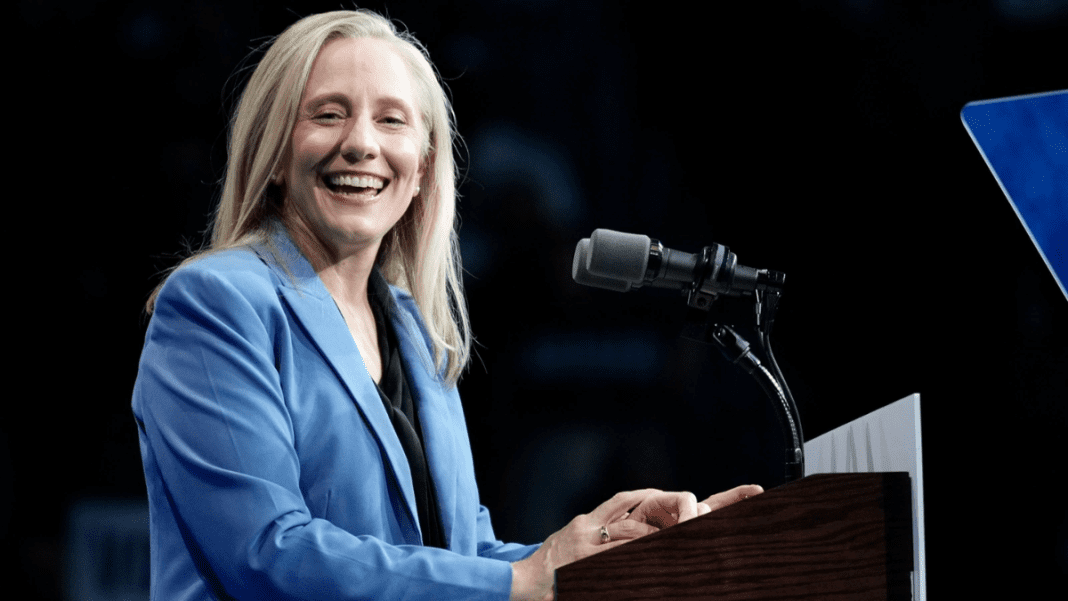Democrat Abigail Spanberger has been elected as the new governor of Virginia, marking a milestone in the state’s political history. The Associated Press called the race on Tuesday night after Spanberger defeated Republican Winsome Earle-Sears.
Her victory makes Abigail Spanberger the first woman ever elected as governor of Virginia, succeeding Republican Governor Glenn Youngkin, who could not seek another consecutive term under state law.
Virginia’s governor’s race often draws national attention because it happens the year after a presidential election. The state has a long record of electing governors from the party opposite that of the sitting U.S. president.
The outcome shows Virginia remains a politically competitive state, where both major parties have strong support. Spanberger’s campaign focused on practical issues like education, jobs, and public safety, which helped her connect with voters across urban, suburban, and rural areas.
From CIA Officer to Governor
Abigail Spanberger’s path to the governor’s office began in public service long before her political career. She worked as a case officer with the Central Intelligence Agency (CIA), specializing in national security and counterterrorism. Her background in intelligence shaped her reputation as calm, disciplined, and focused on results.
In 2018, she entered politics and won a seat in the U.S. House of Representatives, representing a Northern Virginia district that had been closely divided for years. That victory, which flipped a Republican seat, brought her national recognition. During her time in Congress, Spanberger was known for working across party lines and focusing on national security, the economy, and supporting families and small businesses.
After several years in Congress, she announced in 2023 that she would not seek re-election and would instead run for governor. Her campaign for the state’s highest office emphasized unity and problem-solving, urging Virginians to look beyond party divisions.
Her opponent, Winsome Earle-Sears, who currently serves as lieutenant governor, ran a strong campaign emphasizing conservative values and her record in state leadership. The contest between the two women drew national attention as one of the most high-profile political races of the year.
Obama emerges from behind the scenes to shape battle for U.S. democracy as Trump re-ascends
Election Night and Reaction
On election night, results from across Virginia showed a tight race early on. Spanberger gained early leads in urban and suburban areas such as Northern Virginia, Richmond, and Hampton Roads, while Earle-Sears performed strongly in rural regions. As votes were counted, Spanberger’s advantage in the suburbs helped secure her victory.
When the Associated Press projected her win, supporters at her campaign headquarters erupted in celebration. Abigail Spanberger thanked voters for their confidence and pledged to serve all Virginians, regardless of political affiliation.
Political analysts noted that Spanberger’s disciplined campaign and moderate message helped her appeal to a broad range of voters. She emphasized listening to communities and focusing on shared priorities rather than partisan fights.
Winsome Earle-Sears made history in her own right as Virginia’s first Black woman lieutenant governor, and her candidacy continued that record of breaking barriers. The contest between Spanberger and Earle-Sears underscored the growing influence of women in Virginia politics.
With this election, Virginia has chosen its first female governor, closing a historic race that reflected both change and continuity in the state’s political landscape. Abigail Spanberger’s win marks the beginning of a new chapter for the Commonwealth, highlighting her journey from CIA officer to congresswoman to governor — and the evolving story of leadership in Virginia.





